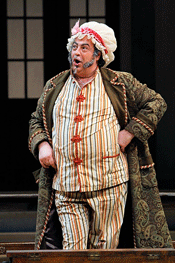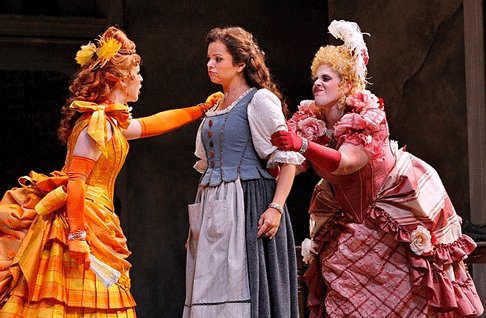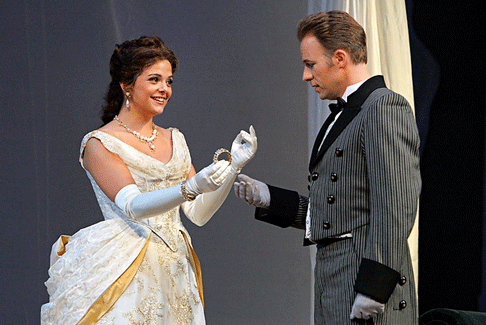07 Nov 2010
La Cenerentola, Minnesota Opera
Minnesota Opera’s recent production of Rossini’s La Cenerentola certainly is a fantastical, comical portrayal of the classical fairy tale.

Minnesota Opera’s recent production of Rossini’s La Cenerentola certainly is a fantastical, comical portrayal of the classical fairy tale.
However, true to Minnesota Opera fashion of exploring creative boundaries in time-honored operatic classics, this production successfully synthesized Rossini’s repetitive musical ideas with stylized, slightly buffo choreography, which brought life to an opera that too often becomes a boring museum relic. With this dash of whimsy, coupled with a stellar ensemble cast, even a fairy godmother couldn’t have concocted a more magical show!
Rossini’s music is notorious for its repetitive melodic material as he layers the orchestral texture with each succession. Stage director and choreographer, Doug Varone, uses this evolving musical medium as inspiration for his stage movement and choreography to further the drama throughout the opera. In his notes, he states, “Staging an opera is very similar to choreographing a dance. If it is done very well, movement ideas are wedded beautifully to the score and can be used to tell the story in much the same way a libretto does… By following my instinctive responses to the music, I allow myself to create a movement scenario that imaginatively brings this aural world to life.”
 Donato DiStefano as Don Magnifico
Donato DiStefano as Don Magnifico
Varone wastes no time in bringing the magical world of Cinderella to life.
From the overture downbeat, the curtain rises on a sleeping Cinderella in a
dusty kitchen. The frantic rhythms in the orchestral texture highlight the busy
day ahead for Cinderella as she hurriedly cleans the kitchen, prepares
breakfast, and tries to ready her two comatose stepsisters for the day. The
music of the overture is often completely bypassed or only partially staged,
however in this production, we are allowed a unique look into
Cinderella’s world, and are even more informed than we would have been if
this additional staging were completely ignored.
Though this production was touted as Roxana Constantinescu’s (Angelina) American debut, Minnesota brought in many incredible headliners and supporting singers that truly allowed this ensemble opera to run seamlessly. A wonderful surprise came from MN Opera’s Resident Artists, Victoria Vargas (Tisbe) and Angela Mortellaro (Clorinda). Both performers embodied their buffa characters completely — Vargas maintained a lovely, full mezzo-tone in her vocal delivery, yet had wonderful physical comic timing, while Mortellaro allowed her voice to become slightly shrill in some of her recitatives to fully evoke her spoiled character.
 Angela Mortellaro as Clorinda, Roxana Constantinescu as La Cenerentola (Angelina) and Victoria Vargas as Tisbe
Angela Mortellaro as Clorinda, Roxana Constantinescu as La Cenerentola (Angelina) and Victoria Vargas as Tisbe
Roxana Constantinescu’s performance as Angelina will certainly open more doors for her in the states. Constantinescu has recently been performing in the Vienna Opera’s ensemble for the 2009-2010 season, singing roles such as Zerlina and Rosina. The role of Angelina has been part of her repertory since her debut at the Teatro Politeama di Lecce. Constatinescu played an endearing Angelina, highlighted by a warm, velvety tone full of connection and lyricism. Her performance of the lyric canzone “Una volta c'era un re” executed exquisite long lines coupled with impeccable phrasing. Her tour de force aria of Act II, “Nacqui all'affanno, al pianto,” shimmered with impeccable, perfectly rhythmic coloratura lines, no doubt influenced by her percussionist background. Unfortunately, her final high notes in the ensemble texture of Act II lacked warmth and finesse found in her lower lyric lines and coloratura. It was unclear whether Constatinescu was vocally exhausted by the demands of Act II, or felt she had to power over the ensemble.
John Tessier (Don Ramiro) had such honesty and simplicity in both his stage presence and his vocal ability. Tessier is certainly put to the test in his aria, “Si, ritrovarla io giuro.” As he sings of his love for this mystery woman, the prince’s valet entourage lifts him up to be undressed and re-dressed into his proper attire. This is all done, of course, as Tessier executes one flawless coloratura line after another, followed by crystal clear high C’s. Truly one of Varone’s more daring staging ideas, but Tessier made the whole ordeal seam like simple child’s play.
 Roxana Constantinescu as La Cenerentola (Angelina) and John Tessier as Don Ramiro
Roxana Constantinescu as La Cenerentola (Angelina) and John Tessier as Don Ramiro
Daniel Mobbs (Alidoro) is the final surprise in this stellar ensemble cast. With a rich bass-baritone, Mobbs astounds with his flexible and incredibly accurate coloratura and command of the bel canto line. With an unshakeable stage presence, Mobbs seemed to command attention in each scene.
An attentive male chorus, executing complicated group staging throughout, rounded out the ensemble. Timing and Italian diction did seem to be sloppy at times, especially in the more parlando sections, but overall supported the scenes well. The Minnesota Opera Orchestra did especially well, determined to keep up with Maetro Christopher Franklin’s demanding tempi.
Sarah Luebke